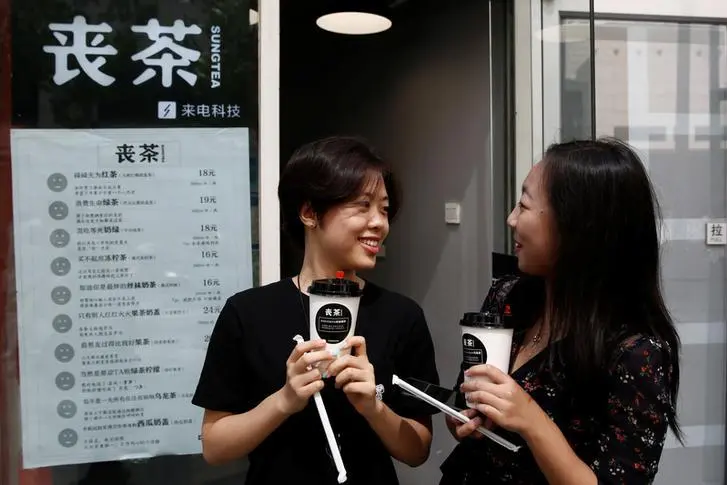PHOTO
(The author is a Reuters Breakingviews columnist. The opinions expressed are her own.)
HONG KONG - Get ready for a tea comeback in China. The drink so closely associated with the country’s history has been supplanted of late in the zeitgeist and financial markets as a bitter battle for coffee dominance rages. In 2021, however, investors will be gulping down the latest craze in steeped leaves.
Despite recent pandemic-related setbacks, Starbucks and its giant roasteries have made a caffeinated splash in Shanghai and beyond. Its success is inviting fresh challengers. The spectacular floundering of local wannabe Luckin Coffee left a competitive gap being filled by McDonald’s, local KFC owner Yum China and others.
As java overflows, bubble tea has been quickly brewing. Since the concept of dropping chewy tapioca balls – or bobas – into black tea was introduced from Taiwan in 1997, China’s consumption has reached five times that of coffee, according to analysts at China Merchants Securities. They reckon the number of shops pouring fresh-brewed product registered 74% growth in 2018.
There are low barriers to entry, but only a few stars have emerged. Heytea was valued at $2.5 billion after raising over $95 million, most recently from Hillhouse Capital and Coatue Management. Founded by Nie Yunchen eight years ago, it operates nearly 600 stores in China. Nayuki, a younger rival with around 350 locations, secured some $100 million in its latest funding round. Smaller Guming is another emerging favourite.
Unlike coffee, which has become a status symbol for China's white-collar elite, bubble tea attracts a younger generation. They’re willing to pay 20 to 40 yuan ($3 to $6) for a cup that may include cheese topping or fruits.
That Generation Z appeal should help make bubble tea purveyors popular with the mom-and-pop Chinese investors who dominate the public markets. Other eateries have fared well. For example, hot-pot chain Haidilao International’s 6862.HK share price had tripled by mid-December since going public in 2018. That bodes well for Heytea and its peers, which could easily command a similar valuation as Starbucks, at 30 times expected earnings.
Things are so hot in tea, in fact, that brewers are eyeing the market for espressos and cappuccinos. By the end of 2021, the coffee makers could be competing back, fully inflating a bubble tea bubble.
CONTEXT NEWS
- Chinese bubble tea chain Nayuki is one step closer to an initial public offering after picking China Merchants Bank to be its lead underwriter, Hong Kong Economics Times reported on Nov. 28, citing unnamed sources.
- Nayuki had filed confidentially for a U.S. initial public offering that could raise as much as $400 million, Bloomberg reported on Feb. 25. It has moved its IPO to Hong Kong due to the impact of the financial fraud committed by Chinese coffee chain Luckin, people familiar with the matter told Chinese tech news outlet 36Kr in June.
- Another Chinese chain, Heytea, was estimated to be worth 16 billion yuan ($2.5 billion) after it closed its latest fundraising round amid planning for an initial public offering, 36Kr reported in March.
(The author is a Reuters Breakingviews columnist. The opinions expressed are her own.)
(Editing by Jeffrey Goldfarb and Sharon Lam) ((yawen.chen@thomsonreuters.com; Reuters Messaging: yawen.chen.thomsonreuters.com@reuters.net))





















